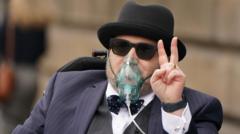In a courtroom drama that seems more like a theatrical performance than a legal proceeding, Nicholas Rossi – known in the UK as Arthur Knight – has captured public attention since his arrest in December 2021. This American fugitive, who attempted to masquerade as an Irish orphan, was caught in the crosshairs of justice after being recognized by hospital staff in Glasgow while recovering from COVID-19. His claims of mistaken identity, however, unraveled alongside a past riddled with accusations of sexual assault in the United States.
Sporting a suit and seated in an electric wheelchair, Rossi initially presented a pitiful picture as he sought to refute the extradition charges brought against him in the U.S. His insistence on being called Arthur Knight marked the beginning of a surreal narrative that oscillated between outrageous claims and outright denials. For his part, Rossi claimed to be an innocent victim, yet details of his life painted a conflicting image.
"I wouldn’t lie to the Archbishop of Canterbury," he asserted fervently as he tried to convince viewers on a BBC segment. His tales ranged from a precarious childhood in Dublin to questionable adventures that included meetings with characters from British television. Yet, pivotal documents such as a birth certificate or a passport remained absent from his persona, casting doubt on his narrative.
Victims and acquaintances from Rossi's past stepped forward, indicating a man whose life was marked not by innocence but by a troubled history of manipulation and abuse. His ex-wife, Kathryn Heckendorn, described troubling aspects of their brief marriage, highlighting behaviors that mirrored those emerging in court today. Mary Grebinski, a survivor, remembered the identity of a man who had profoundly impacted her life through a sexual assault.
Notably, the story of Nicholas Rossi veered towards farce when it was revealed that he had faked his own death in 2020. The peculiar circumstances surrounding his supposed demise led to public outcry and disbelief, particularly when a priest was warned against hosting a memorial mass. Rossi was a well-known figure in Rhode Island circles due to his previous advocacy; thus, his disappearance was initially met with shock.
Compounding the absurdity of the legal proceedings, Rossi's self-dramatizing antics created obstacles in the court, from ludicrous claims regarding a tattoo while in a coma to raucous outbursts aimed at his attorneys. As time wore on, his imposter role faltered, with a Scottish sheriff ultimately dismissing his implausible claims.
The turning point came unexpectedly during a bail hearing last year when Rossi dropped his charade. In this moment of candor, he identified himself as Nicholas Alahverdian, acknowledging his buried identity. The revelation gave insight into a web of complex and troubling narratives, raising more questions than answers about the motivations behind his deceit and the veracity of his claims.
As Rossi readies for two separate rape trials later this year, the courtroom spectacle continues to unfold. With serious allegations against him and a history of deception, this saga highlights the intersection of identity, truth, and the anonymity that the fugitive life can mistakenly afford. While the drama could capture an audience, the abrupt shift in narrative underlines a stark reality: behind every spectacle lies a gravity shaped by real lives impacted.
Sporting a suit and seated in an electric wheelchair, Rossi initially presented a pitiful picture as he sought to refute the extradition charges brought against him in the U.S. His insistence on being called Arthur Knight marked the beginning of a surreal narrative that oscillated between outrageous claims and outright denials. For his part, Rossi claimed to be an innocent victim, yet details of his life painted a conflicting image.
"I wouldn’t lie to the Archbishop of Canterbury," he asserted fervently as he tried to convince viewers on a BBC segment. His tales ranged from a precarious childhood in Dublin to questionable adventures that included meetings with characters from British television. Yet, pivotal documents such as a birth certificate or a passport remained absent from his persona, casting doubt on his narrative.
Victims and acquaintances from Rossi's past stepped forward, indicating a man whose life was marked not by innocence but by a troubled history of manipulation and abuse. His ex-wife, Kathryn Heckendorn, described troubling aspects of their brief marriage, highlighting behaviors that mirrored those emerging in court today. Mary Grebinski, a survivor, remembered the identity of a man who had profoundly impacted her life through a sexual assault.
Notably, the story of Nicholas Rossi veered towards farce when it was revealed that he had faked his own death in 2020. The peculiar circumstances surrounding his supposed demise led to public outcry and disbelief, particularly when a priest was warned against hosting a memorial mass. Rossi was a well-known figure in Rhode Island circles due to his previous advocacy; thus, his disappearance was initially met with shock.
Compounding the absurdity of the legal proceedings, Rossi's self-dramatizing antics created obstacles in the court, from ludicrous claims regarding a tattoo while in a coma to raucous outbursts aimed at his attorneys. As time wore on, his imposter role faltered, with a Scottish sheriff ultimately dismissing his implausible claims.
The turning point came unexpectedly during a bail hearing last year when Rossi dropped his charade. In this moment of candor, he identified himself as Nicholas Alahverdian, acknowledging his buried identity. The revelation gave insight into a web of complex and troubling narratives, raising more questions than answers about the motivations behind his deceit and the veracity of his claims.
As Rossi readies for two separate rape trials later this year, the courtroom spectacle continues to unfold. With serious allegations against him and a history of deception, this saga highlights the intersection of identity, truth, and the anonymity that the fugitive life can mistakenly afford. While the drama could capture an audience, the abrupt shift in narrative underlines a stark reality: behind every spectacle lies a gravity shaped by real lives impacted.





















